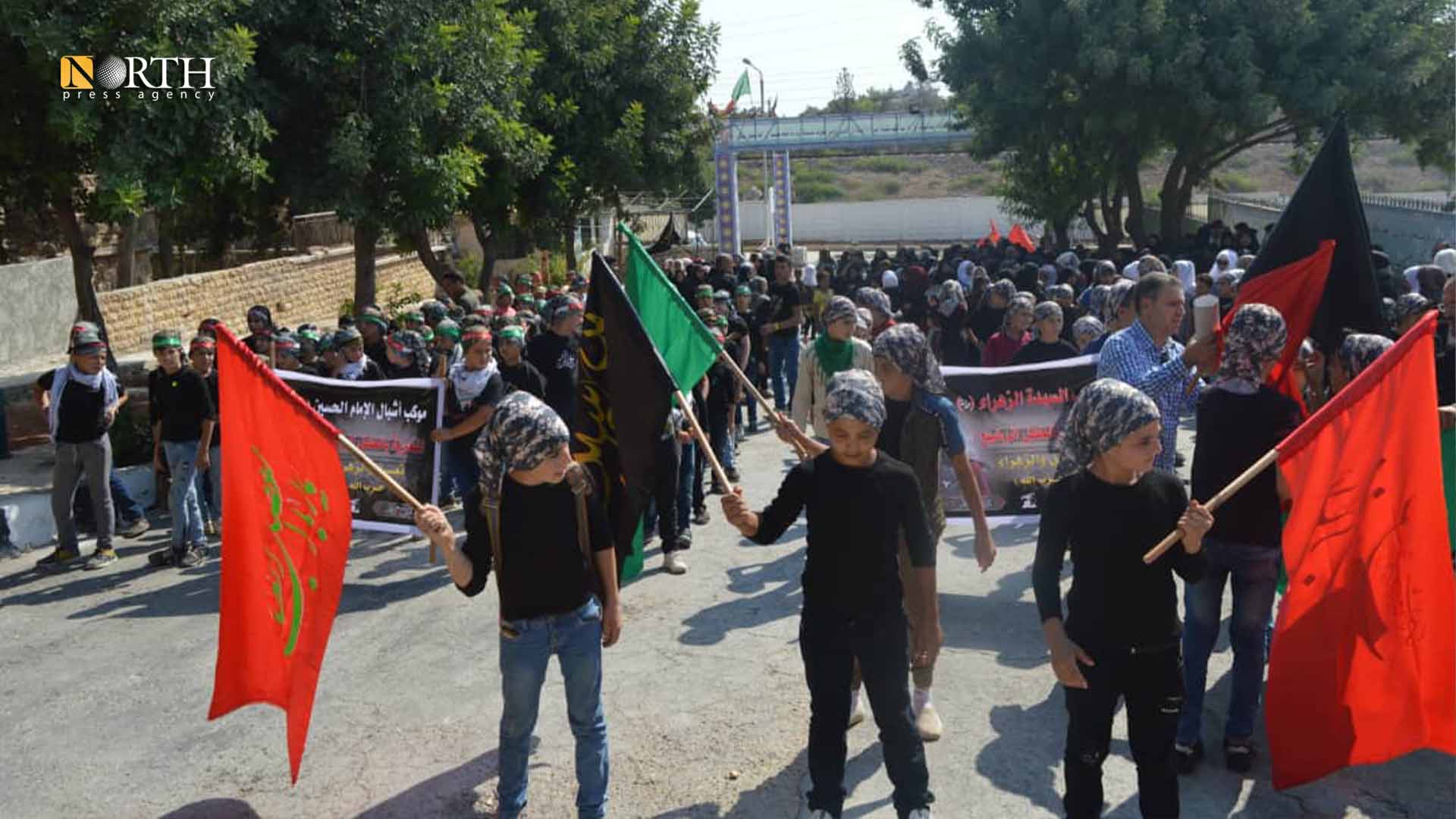ALEPPO COUNTRYSIDE, Syria (North Press) – Ali al-Taqqi does not mind sending his nine-year-old child to join the cultural and sporting activities that scout groups organize in the town of Nubul, in the northern countryside of Aleppo.
However, what al-Taqqi has reservations about, is the “religious ideology and jihadist ideas on the Iranian style” that the supervisors of the scouting work are instructing in the Shiite towns of Nubul and Zahra’ in the northern countryside of Aleppo.
“What really concerns me is the military and jihadist ideas that they instruct the children instead of letting them play, draw and swim. They must not be asked to chant jihadist slogans like Death to America or the Liberation of Jerusalem,” he added.
“Nubul and Zahra’ have sacrificed many of their youths and elite figures as a result of such slogans during the miserable Syrian war,” he referred.
Both towns have a population of 70,000, and they are 20 km away from the city of Aleppo, but they are administratively affiliated with the region of Azaz.
“We want the scouting to continue in accordance with our traditions not in accordance with the Iranian vision.”
Ideologizing children
In early 2013, a children’s educational organization was formed in Nubul and Zahra’ bearing the title of “Scouts of Imam Mahdi,” sponsored by clerics close to Iran.
Scouts were divided into groups deployed in most of the neighborhoods of the towns “to attract the children and contain them culturally and cognitively within a religious vision while creating a space for playing through sports and entertainment activities.”
Hussein Shams al-Din, a math teacher in Nubul, believed that scouting is “politicized and unable to give the child any space to create and think freely.”
Shams al-Din resembles scouting in Nubul and Zahra’ with a strict military system as it targets those aging between six and 12 years old.
What the child is required to do, is “the morning attendance of the religious classes in mosques, then, the commitment of praying, listening to clerics’ religious speeches and the attendance of religious events,” he added.
“Even when camping and walking in nature, the situation is similar to a military system in which the child is chanting religious and jihadist slogans,” he referred.
“These programs kill the children’s creativity and make them fighters, not creative,” the teacher noted.
The aspects of the Iranian Shiite culture expansion in both towns are reflected in the revival of the births and deaths of Shiite imams, Ashura rituals, and the building of mosques and hussainiya (a congregation hall for Twelver Shia Muslim commemoration ceremonies).
In February, Iran announced the opening of an office of the Iranian technology in Syria, which will be determined to publish the Iranian religious content to Syrians.
The Iranian presence and its military and security emergence have dominated the past ten years, and still continues.
Recently, press reports cited observers providing that Iran is heading to increase its penetration in Syria by replacing its tools, and is working to enhance its presence in the Syrian economic, social and cultural structures to formalize its various activities and movements in the Syrian government-held areas.
Iranian interest
Before 2013, Nubul and Zahra’ were besieged from three sides by Ahrar al-Sham, al-Nusra Front and the Levant Front that lasted for three years.
As for the northern side, it was under the control of the Internal Security Forces (Asayish) in Afrin, where the supplies were reaching both towns from it.
Militants of Hezbollah and pro-Iranian factions managed to break the siege of the towns supported by the Russian air force in 2016.
In 2014, Syrian figures accused the Iranian Cultural Chancellery in Damascus of conducting activities that contradicts the declared goals. However, Syrian Shiite clerics denied that.
The Iranian presence in Nubul and Zahra’ is not limited to the military side, but the cultural presence has a prominent role even before the outbreak of the Syrian war.
With the beginning of the Syrian war, the approach of Wilayat al-Faqih (Guardianship of the Islamic Jurist) and loyalty to the Iranian leader, which is called “Taqlid” in the Shiite religious tradition, have spread.
Iran resorted to the recruitment of fighters from Nubul and Zahra’ through clerics. Then, it established cultural associations and scouting groups of males and females through securing potential and financial support.
Solicitation policy
Iran continues to volunteer fighters from Syria within its affiliated factions, following a solicitation policy through providing several offers and exploiting the living and economic conditions that Syria witnesses.
“If that money that Iran spent on clerics and religious activities, was used properly, the economic situation in both towns would not be worse,” Rasoul Mustafa from Zahra’, said.
However, what matters to Iran is “to spread its ideas, mobilize the youths and even children to fight on its fronts and serve its agenda,” he added.
Muhammad Abdulsattar, supervisor of one of the scouting groups in Zahra’ denied “the exaggeration that the parents are talking about, of the role of the Mahdi Scouts as brainwashing the children and preparing them to later engage in military activities. These accusations are exaggerated.”
The scouting in Nubul and Zahra’ is not different from that in the churches of Aleppo, that is, it is sponsored by clerics with the aim of preparing a committed moral generation.”

